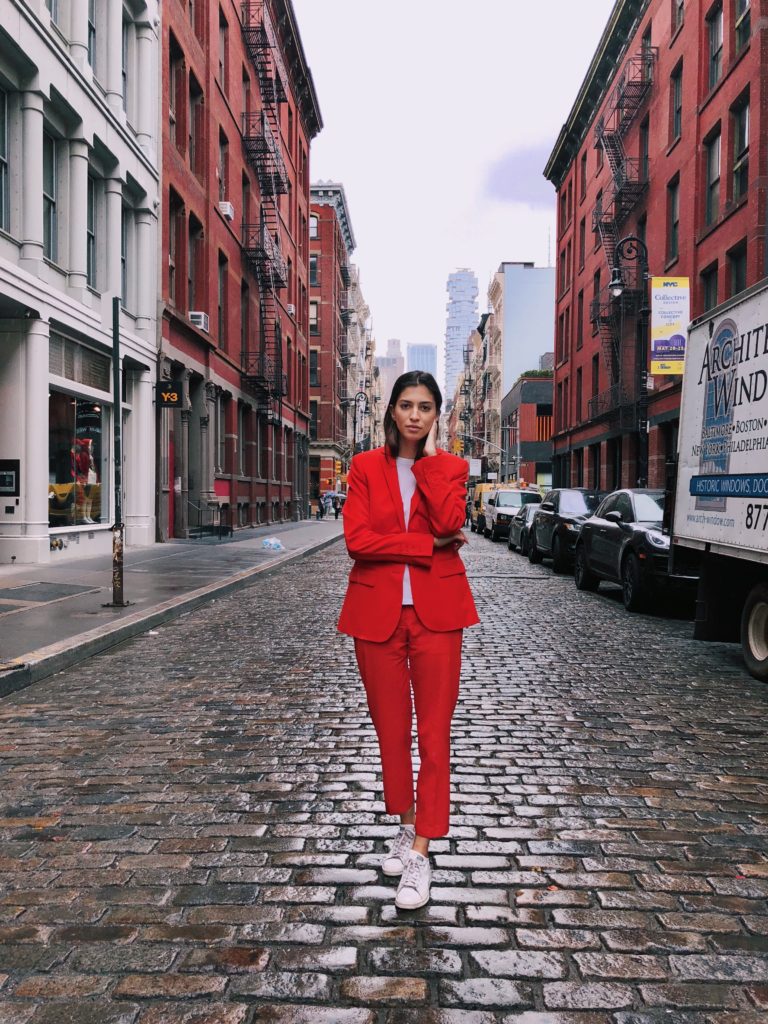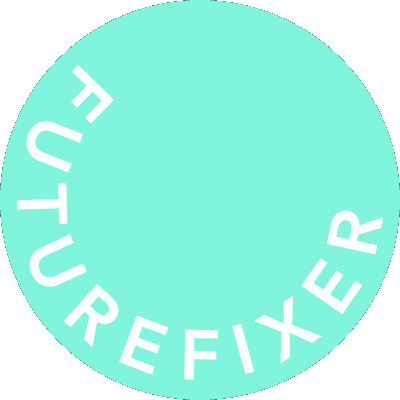
Marina Testino is an award-winning ARTivist who works at the intersection of fashion and advocacy. It’s well known that the fashion industry has been a big pollutant, but attitudes are starting to shift, and it is visionaries like Marina who are helping to change the tides.
Marina has diverse experience in the fashion industry, so she has come to understand it from a variety of perspectives. Some of her experiences include internships at French Vogue and Art Partner, shadowing her uncle Mario Testino, and working at Orchard Mile and Purple PR. She then started modelling so that she could start her own clothing brand, and through that she learned all about clothing production.
Her big break in ARTivist was through the #OneDressToImpress activation. In it, she wore the same red suit for two months straight, in an effort to counter fast fashion. In 2017 she founded Point Off View, a mission-driven micro agency focused on digital communication and sustainable transformation, and she was recently recognised for her achievements when she received the Eco Award from Elle for her work as an ARTivist.

Meet the FutureFixer: Marina talks to Atlas of the Future about her passion for the fashion industry and what fashion brands can do to work towards a more sustainable future.
I want to make sustainability the new norm within the fashion industry, that’s really at the heart of everything I’m doing, personally and with Point Off View. One of the biggest things I want to communicate is that conscious shopping doesn’t mean giving up the things that make fashion fun. You can still embrace your personal style, express yourself with bold colours, and feel sexy or luxurious while being more mindful of what you wear.
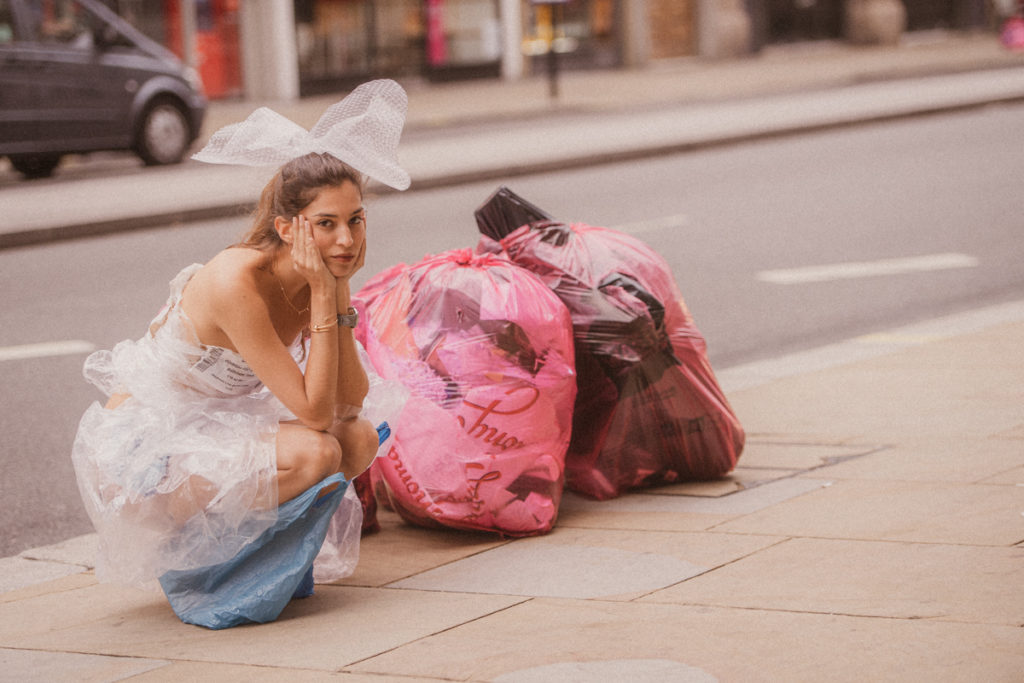
“I want to make sustainability the new norm within the fashion industry.”
If we want to normalise sustainable fashion, it’s important to empower brands to move toward more conscious choices. It’s equally important to empower consumers with the knowledge to make these choices: what they buy, how they buy, and who they are buying from. Point Off View is working toward this goal by consulting brands on how they can become more conscious and sustainable and providing creative direction so that they can shape their messaging in more powerful and creative ways.
My diverse experiences in the fashion industry have exposed me to the amount of waste that each sector in the industry creates. Understanding the industry from so many angles—and seeing all of the flaws from each sector accumulate—it became impossible to ignore the dangers it poses not only to the environment, but also to our health and our communities.
My other source of motivation is my lifelong love of fashion and the amazing, creative industry it can be. Fashion is a source of inspiration and empowerment for myself and so many others. But if we want to keep enjoying it, it’s critical that the industry shifts to a more conscious mindset and re-examines how it operates.
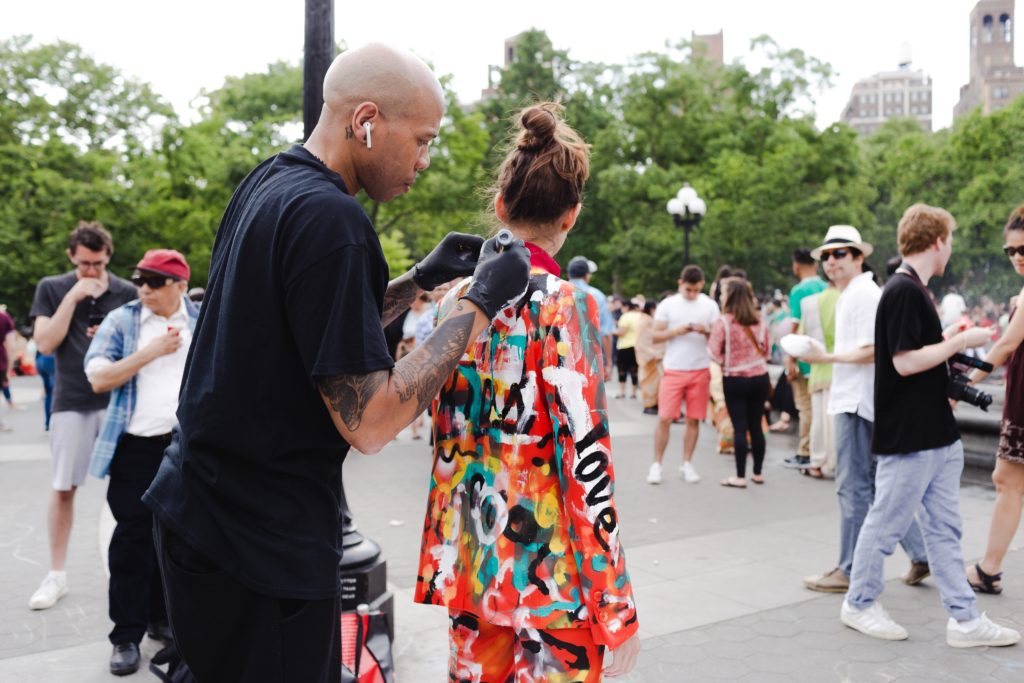
“If we want to normalise sustainable fashion, it’s important to empower brands to move toward more conscious choices.”
At the end of the day, I believe in the fashion industry. I love this industry—and I am a part of this industry—but we need to do better. And I know we can.
I’ve definitely seen a shift in attitudes to sustainable fashion over the years. I’ve been part of the sustainable fashion movement for the last six years. When I started, “sustainability” wasn’t a word in the fashion industry’s vernacular. Or at least not a positive one. It was as if a brand could either be sustainable or fashionable, there was no middle ground. That’s largely what motivated me to become an advocate for sustainable fashion. I wanted to redefine the industry norm. I wanted fashion and sustainability to coexist, instead of having to choose between one or the other. Thankfully, a lot has changed since then.
Just look at major brands today, many of them are either trying to do something or are actively doing something to incorporate sustainability into their business models. It’s become common for brands to have entire departments devoted to sustainability, and brands are becoming more transparent about their efforts to become more sustainable, whether they are investing in material research, creating more conscious packaging, or restructuring their supply chain.
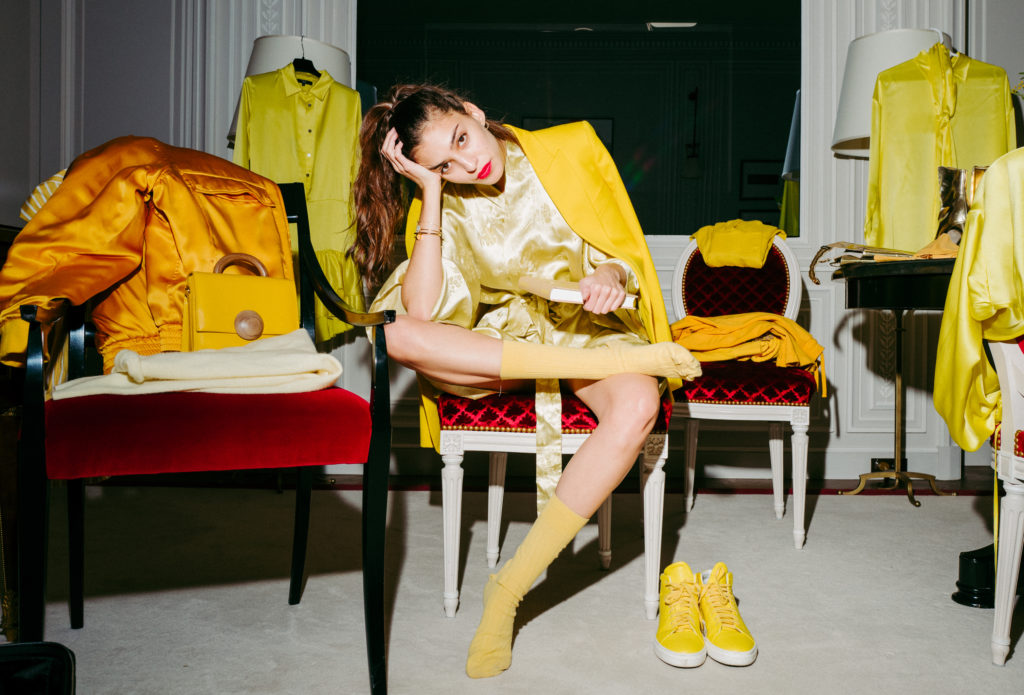
Marina Testino, photo by Vikram Valluri.
I think a lot of this comes down to a change in the consumer’s mindset through increased access to education around the topic. People are becoming more aware of brands and their practices, which is amazing. As consumers are becoming more informed about sustainability, they are demanding it from the brands they shop. And as these demands increase, more and more brands are investing toward a change. If we continue in this direction, it will either force brands to make positive changes or push those who don’t out of the market. There’s still a lot of work to do, but I am excited to see how the fashion industry continues to transform.
As an ARTivist, I am very proud of my #OneDressToImpress activation, which was actually the first activation I ever did. In it, I wore the same red suit for two months straight. The idea behind it was to go against the concept of fast fashion, the feeling that “I don’t have anything to wear,” the impulse to over-consume, and to encourage people to love the clothes they already own.
This activation was a turning point in my career. When I got the idea for #OneDressToImpress, I had just started modelling. Because I was committed to having this red suit as my uniform, I had to tell my agency that I wouldn’t be working with brands or doing anything that would require me to wear something else. That was really scary. Not only was I giving up working for the next two months, but I was also taking a stance against the prevailing mindsets in my industry. The fashion industry is always promoting the next season, the next popular colours, the next trend, or the next thing to buy. I felt like this was empowering fast fashion and fuelling a consumption society that I do not agree with.
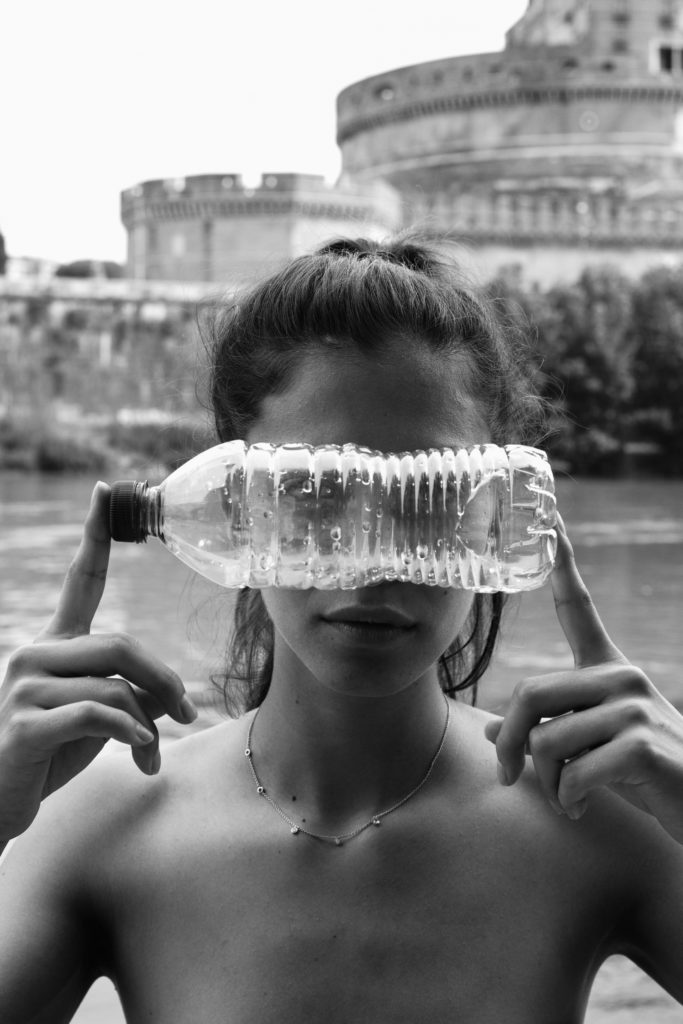
“As consumers are becoming more informed about sustainability, they are demanding it from the brands they shop.”
As a young model taking such a public stance against the industry, I knew there was a huge chance for failure. But I went forward with it regardless because I was so opposed to the senseless, continuous consumption and throw-away culture that the industry was promoting. It was very important to me to pursue the idea that there’s an alternative way to be fashionable by valuing what we already own, taking care of our clothes, and only buying things with long-term value. Like I said, taking this step was really scary. No doubt, this activation could have backfired and taken a toll on my career. I had no idea what the outcome would be. It was a huge risk, but I’m proud to say it ended up going very well.
My long-term vision for Point Off View is to help brands through their sustainable transformations. Specifically, on the creative end, we want to help brands tell their stories. As they transition, it’s key for them to communicate what they are doing, why they are doing it, and why others should follow their lead and become more conscious. Through consulting and creative direction, we want to continue to help the industry grow and thrive. Additionally, we want to continue working with organisations to spread awareness about issues in different industries, while focusing on solutions that both brands and consumers can partake in.
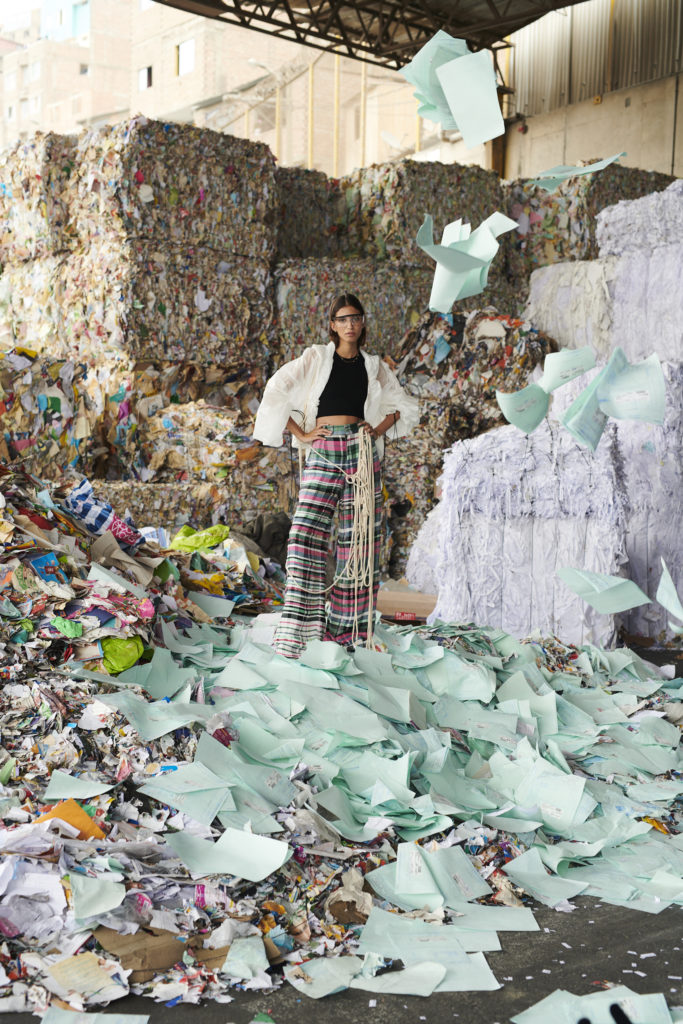
“My long-term vision for Point Off View is to help brands through their sustainable transformations.”
I truly believe that the consumer has the power to demand change. However, in addition to demanding change from brands, what we really need to do is demand that our governments take action. Ultimately, governments hold the power to enforce change through laws and regulations that can restrict brands from engaging in overproduction, pollution, improper employment conditions, and many other important issues that need to be addressed. Consumers can’t make these changes on their own, so it’s critical for the government to stand up and require a shift toward sustainability.
There also needs to be a true investment in continued research—creating new technologies and materials, rethinking supply chains—that promotes a sustainable future, as opposed to easy, short-term solutions. I think a great step forward would be the development of long-term solutions that diminish the use and production of plastics and their accumulation in our environment. We desperately need conscious alternatives to plastics—and not the alternatives we already have, which aren’t biodegradable—that can be ethically produced and degrade in our environment without harming it.
AtlasAction ► Learn more about Point Off View and their actions and innovations for sustainable fashion futures. Marina will also be speaking at Fixing the Future Festival, 16 & 17 September 2022.
